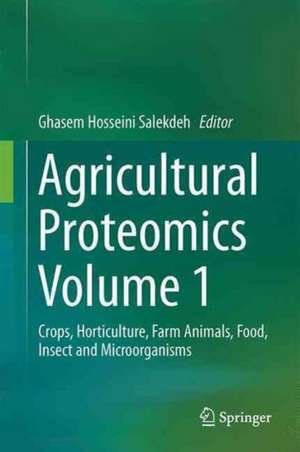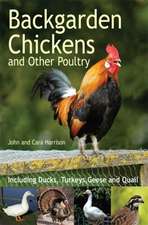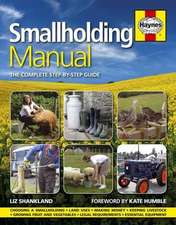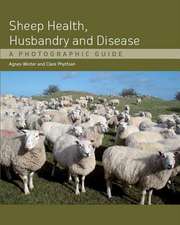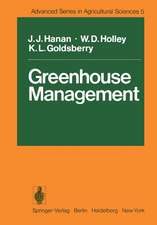Agricultural Proteomics Volume 1: Crops, Horticulture, Farm Animals, Food, Insect and Microorganisms
Editat de Ghasem Hosseini Salekdehen Limba Engleză Hardback – 29 aug 2016
An emerging field of the proteomics aim is to integrate knowledge from basic sciences and to translate it into agricultural applications to solve issues related to economic values of farm animals, crops, food security, health, and energy sustainability. Given the wealth of information generated and to some extent applied in agriculture, there is the need for more efficient and broader channels to freely disseminate the information to the scientific community.
| Toate formatele și edițiile | Preț | Express |
|---|---|---|
| Paperback (1) | 781.58 lei 38-45 zile | |
| Springer International Publishing – 13 iun 2018 | 781.58 lei 38-45 zile | |
| Hardback (1) | 416.71 lei 3-5 săpt. | +33.54 lei 6-12 zile |
| Springer International Publishing – 29 aug 2016 | 416.71 lei 3-5 săpt. | +33.54 lei 6-12 zile |
Preț: 416.71 lei
Nou
Puncte Express: 625
Preț estimativ în valută:
79.74€ • 83.25$ • 65.99£
79.74€ • 83.25$ • 65.99£
Carte disponibilă
Livrare economică 14-28 martie
Livrare express 27 februarie-05 martie pentru 43.53 lei
Preluare comenzi: 021 569.72.76
Specificații
ISBN-13: 9783319432731
ISBN-10: 3319432737
Pagini: 353
Ilustrații: XI, 255 p. 27 illus., 22 illus. in color.
Dimensiuni: 155 x 235 x 20 mm
Greutate: 0.64 kg
Ediția:1st ed. 2016
Editura: Springer International Publishing
Colecția Springer
Locul publicării:Cham, Switzerland
ISBN-10: 3319432737
Pagini: 353
Ilustrații: XI, 255 p. 27 illus., 22 illus. in color.
Dimensiuni: 155 x 235 x 20 mm
Greutate: 0.64 kg
Ediția:1st ed. 2016
Editura: Springer International Publishing
Colecția Springer
Locul publicării:Cham, Switzerland
Cuprins
1. Applications of quantitative proteomics in plant research; Mehdi Mirzaei, Yunqi Wu, David Handler, Tim Maher, Dana Pascovici, Prathiba Ravishankar, Masoud Zabet Moghaddam, Paul A. Haynes, Ghasem Hosseini Salekdeh, Joel M. Chick, and Robert Willows
2. Seed proteomics: an overview; Kanika Narula, Arunima Sinha, Toshiba Haider, Niranjan Chakraborty, Subhra Chakraborty
3. Fruit development and ripening: proteomic as an approach to study Olea europaea and other non-model organisms; Linda Bianco and Gaetano Perrotta
4. Proteomics in detection of contaminations and adulterations in agricultural foodstuffs; Javad Gharechahi, Mehrshad Zeinolabedini, and Ghasem Hosseini Salekdeh
5. Holistic sequencing: Moving forward from plant microbial proteomics to metaproteomics; Behnam Khatabi, Neda Maleki Tabrizi, and Ghasem Hosseini Salekdeh
6. Proteomics in Energy Crops; Shiva Bakhtiari, Meisam Tabatabaei, and Yusuf Chisti
7. The Proteome of Orchids; Chiew Foan Chin
8. Proteomic Tools for the Investigation of Nodule Organogenesis; Nagib Ahsan and Arthur Salomon
9. Proteomic Applications for Farm Animal Management; Ehsan Oskoueian, William Mullen, and Amaya Albalat
10. Applications of proteomics in Aquaculture; Pedro M Rodrigues, Denise Schrama, Alexandre Campos, Hugo Osório, Marisa Freitas
11. Wool proteomics; Jeffrey E. Plowman and Santanu Deb-Choudhury
12. Proteomic research on honeybee; Yue Hao and Jianke Li
Notă biografică
Dr. Ghasem Hosseini Salekdeh received his PhD from International Rice Research Institute (IRRI). He is currently Associate Professor at Agricultural Biotechnology Research Institute of Iran. His research focuses on discovering novel pathways and genes using proteomics and genomics approaches. He also works on recombinant protein expression technologies.
Textul de pe ultima copertă
This book will cover several topics to elaborate how proteomics may enhance agricultural productivity. These include crop and food proteomics, farm animal proteomics, aquaculture, microorganisms and insect proteomics. It will also cover several technical advances, which may address the current need for comprehensive proteome analysis.
An emerging field of the proteomics aim is to integrate knowledge from basic sciences and to translate it into agricultural applications to solve issues related to economic values of farm animals, crops, food security, health, and energy sustainability. Given the wealth of information generated and to some extent applied in agriculture, there is the need for more efficient and broader channels to freely disseminate the information to the scientific community.
Agricultural Proteomics can play a role in addressing the growing demand for food. The application of proteome science in agriculture has allowed researchers to identify a broad spectrum of proteins in living systems and associates them to many major traits. It may give clues not only about nutritional value but also about yield production and food quality and how environments affect these factors. In recent years, technical improvements in the mass spectrometry, bioinformatics, protein extraction and separation have made the high-throughput analysis of agricultural products feasible and the reproducibility of the technology has reduced errors in assaying protein levels. Meanwhile, the application of mass spectrometry-based quantification methods have become mainstream in recent year. The rapid advances of genome sequencing tools also paved the way to sequence the full genome of many crops, animals, insects, and microorganisms. This provided proteomics scientist with a huge number of reference genome and genes for genome wide proteome analysis.
Caracteristici
Covers a wide range of proteomics application in Agriculture
Update in a fast growing field
International contributors
Includes supplementary material: sn.pub/extras
Update in a fast growing field
International contributors
Includes supplementary material: sn.pub/extras
